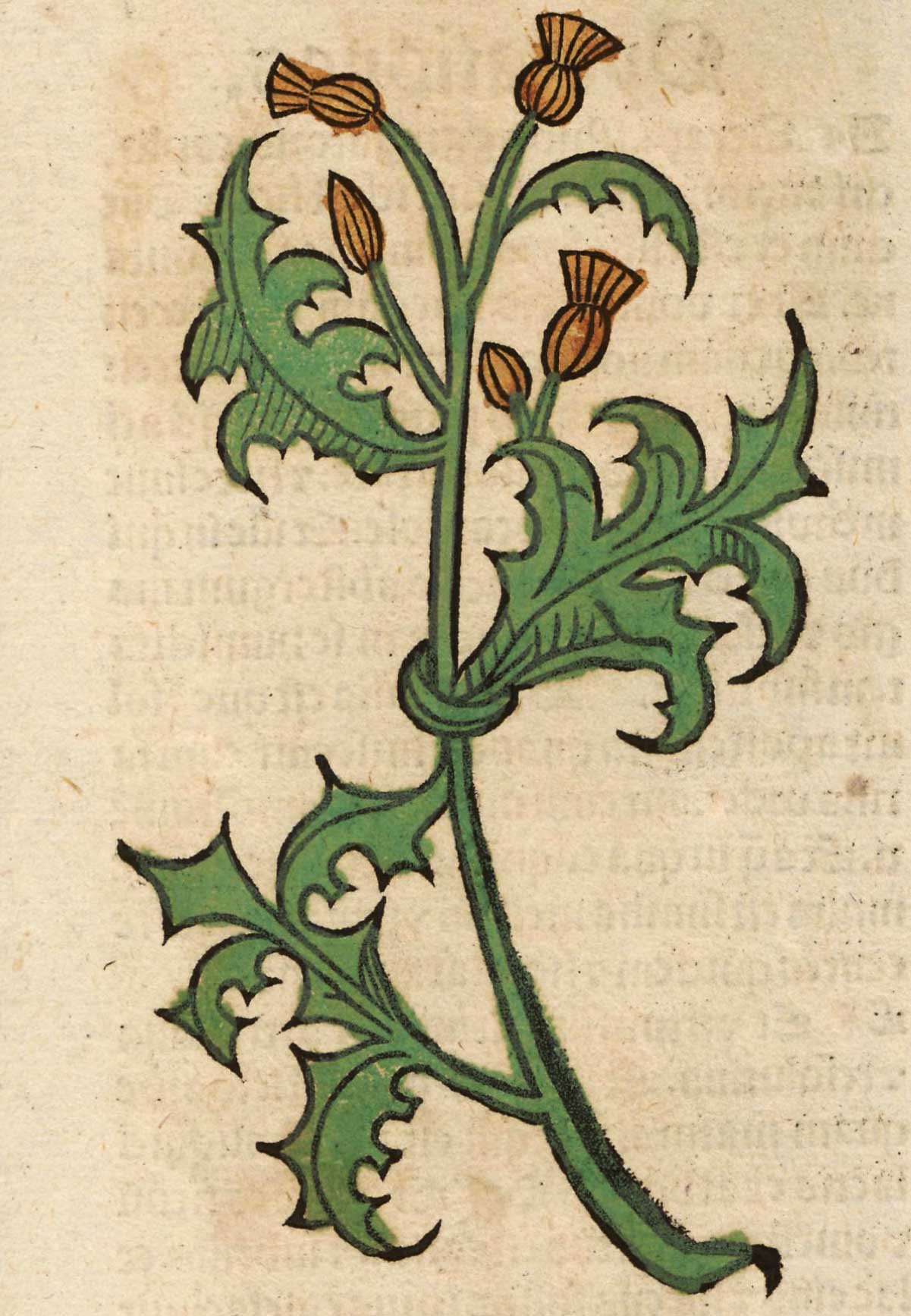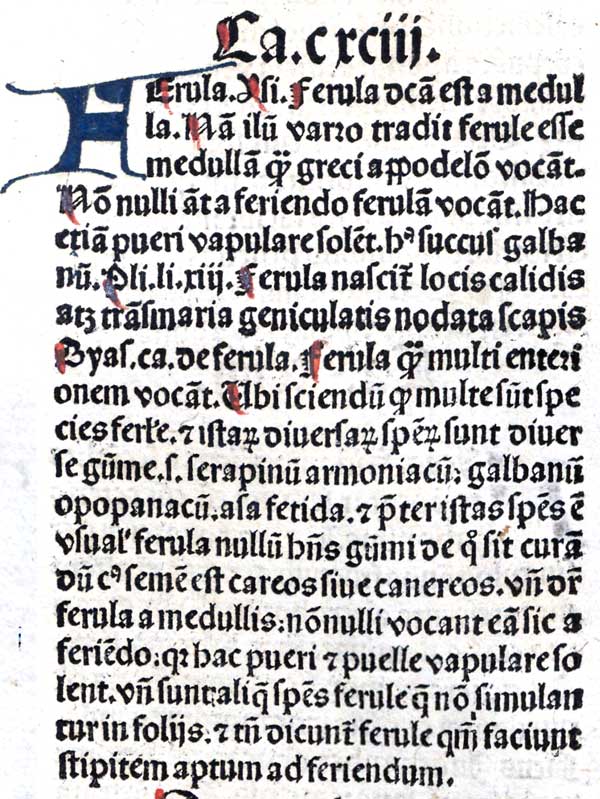“…than is the ferule and the boulas to the scholars of Navarre…”
Among the examples of pairings whose antipathies are not as vehement as the hatred thieves have of a certain usage of Pantagruelion.
Notes
Ferula
Ferula (text)
Fennel
ateriariam Daedalus, et in ea serram, asciam, perpendiculum, terebram, glutinum, ichthyocollam; normam autem et libellam et tornum et clavem Theodorus Samius, mensuras et pondera Phidon Argivus, aut Palamedes ut maluit. Gellius; ignem e silice Pyrodes Cilicis filius, eundem adservare Prometheus, vehiculum cum quattuor rotis Phryges, mercaturas Poeni, culturam vitium et arborum Eumolpus Atheniensis, vinum aquae miscere Staphylus Sileni filius, oleum et trapetas Aristaeus Atheniensis, idem mella; bovem et aratrum Buzyges Atheniensis, ut alii Triptolemus; regiam civitate Aegyptii, popularem Attici post Theseum. tyrannus primus fuit Phalaris Agraganti. servitium invenere Lacedaemonii. iudicium capitis in Areopago primum actum est.
Carpentry was invented by Daedalus, and with it the saw, axe, plumb-line, gimlet, glue, isinglass; but the square, the plummet, the lathe and the lever by Theodorus of Samos, measures and weights by Phidon of Argos, or, as Gellius preferred, Palamedes; fire from flint by Pyrodes son of Cilix, the storing of fire in a fennel-stalk by Prometheus; a vehicle with four wheels by the Phrygians, trade by the Phoenicians, viticulture and arboriculture by Eumolpus of Athens, diluting wine with water by Staphylus son of Silenus, oil and oil-mills by Aristaeus of Athens, honey by the same; the ox and the plough by Buzyges of Athens, or, as others say, by Triptolemus; monarchical government by the Egyptians, republican by the Athenians after Theseus. The first tyrant was Phalaris at Girgenti. Slavery was invented by the Spartans. Capital trials were first carried on in the Areopagus.
ferula
Fennel-giant makes very agreeable fodder for the ass; to other beasts of burden, however, it is a quick poison. For this reason the animal is sacred to Father Liber, as is also fennel-giant. Lifeless things also, even the most insignificant, have each their own special poisons.
ferule
Et ferulam inter externas dixisse conveniat arborumque generi adscripsisse, quoniam quarundam naturae, sicuti distinguemus, lignum omne corticis loco habent forinsecus, ligni autem loco fungosam intus medullam ut sabuci, quaedam vero inanitatem ut harundines. calidis nascitur locis atque trans maria, geniculatis nodata scapis. duo eius genera: nartheca Graeci vocant adsurgentem in altitudinem, nartheciam vero semper humilem. a genibus exeunt folia maxima ut quaeque terrae proxima; cetera natura eadem quae aneto, et fructu simili. nulli fruticum levitas maior; ob id gestatu facilis baculorum usum senectuti praebet.
It may be suitable to have fennel giant [Ferula communis] mentioned among the exotics and assigned to the genus ‘tree,’ inasmuch as the structure of some plants, in the classification that we shall adopt, has the whole of the wood outside in place of bark and inside, in place of wood, a fungous pith like that of the elder, though some have an empty hollow inside like reeds. This fennel grows in hot countries over sea; its stalk is divided by knotted joints. It has two varieties, one called in Greek narthex, which rises to some height, the other narthecia, which always grows low. From the joints shoot out very large leaves, the larger the nearer to the ground; but in other respects it has the same nature as the dill, and the fruit is similar. No shrub supplies a wood of lighter weight, and consequently it is easy to carry, and supplies walking-sticks to be used by old gentlemen.
La ferula
cirrata loris horridis Scythae pellis,
qua vapulavit Marsyas Celaenaeus,
ferulaeque tristes, sceptra paedagogorum,
cessent et Idus dormiant in Octobres
Schoolmaster, spare your innocent flock; so may long-haired boys crowd to hear you and the dainty band around your table hold you in affection, nor any teacher of arithmetic or rapid master of shorthand be surrounded by a larger circle. The bright days glow beneath the flaming Lion and blazing July ripens the roasted harvest. Idle be the Scythian’s leather, fringed with horrid lashes, with which Marsyas of Celaenae was scourged, and the sinister rods, scepters of pedagogues; let them sleep till October’s Ides. If boys keep well in summertime, they learn enough.
ferule
80. Ferulae
Invisae nimium pueris grataeque magistris,
clara Prometheo munere ligna sumus.
80. Rods
Most hateful to boys and agreeable to schoolmasters, we are the sticks made famous by Prometheus’ gift.
ferule
et nos ergo manum ferulae subduximus
This is exactly what you can expect from the greatest and the least of poets. Well, I too have snatched my hand from under the cane. [Corporal punishment was regular in Roman schools.] I too have given Sulla advice, to retire and enjoy a deep sleep.
Ferule
Ferule: A Ferula, or Paulmer used in Schooles for correction; also, the hearbe Ferula, Sagapene, Fennell Giant; also, a reed, or cane.
ferulacée
Ferulacé: Round, also, of the kind of the herbe Ferula.
Ferule: A Ferula, or Paulmer used in Schooles for correction; also, the herbe Ferula, Sagapene, Fennell Giant; also, a reed, or cane.
Ferule
Ferula was used by the Romans to punish schoolboys. Cf. Martial, x. 62, 10; xiv. 80.
ferule
Ferula communis, D. C., ombellifère dont la tige servait à fustiger les écoliers.
Invisæ nimium pueris, gratæque magistris
Clara Prometheo munere ligna sumis, dit Martial, X, 62, 10. Et Juvénal, Sat., I, v. 15: Et nos ergo manum ferulæ subduximus. (Paul Delaunay)
Nenuphar…
Encore une fois, la plupart de ces exemples se retrouvent dans le De latinis nominibus de Charles Estienne. Le nenufar et la semence de saule sont des antiaphrodisiaques. La ferula servait, dans l’Antiquité, à fustiger les écoliers (cf. Martial, X, 62-10).
ferula
ferula. [adopted from Latin ferula giant fennel, a rod.]
A genus of plants; the giant fennel.
1398 John de Trevisa Bartholomeus De proprietatibus rerus xvii. lxxi. (1495) 645 Ferula is an herbe.
1562 William Turner A new herball, the seconde parte ii. 1 b, The nature of Ferula is the sorest enemie that can be to Lampreys.
From the use of the fennel-stalk in Roman times: A cane, rod, or other instrument of punishment, especially a flat piece of wood; figuratively school discipline.
1562 William Turner A new herball, the seconde parte ii. (1568) 66 The roote of the whyte Nymphea is black,… of the yelow… whyte.
1601 Philemon Holland, translator Pliny’s History of the world, commonly called the Natural historie II. 222 Nenuphar is called in Greeke Nymphæa.
1673 Ray Journ. Low C. (1693) II. 97 Their Alterative Physick consists of Coolers, and Anodyns, as Nymphæa, Poppy, Endive.
1741 Complete family piece and country gentleman and farmer’s best guide ii. iii. 374 In the Water Tubs, the yellow Nymphea or Water Lilly.
Ferula
Ferula (from Latin ferula, “rod”) is a genus of about 170 species of flowering plants in the family Apiaceae, native to the Mediterranean region east to central Asia, mostly growing in arid climates. They are herbaceous perennial plants growing to 1–4 m tall, with stout, hollow, somewhat succulent stems. The leaves are tripinnate or even more finely divided, with a stout basal sheath clasping the stem. The flowers are yellow, produced in large umbels. Many plants of this genus, especially F. communis are referred to as “giant fennel,” although they are not fennel in the strict sense.
The Romans called the hollow light rod made from this plant a ferula (compare also fasces, judicial birches). Such rods were used for walking sticks, splints, for stirring boiling liquids, and for corporal punishment.
The ferula also shows up in mythological contexts. The main shaft of a thyrsus was traditionally made from this plant, and Prometheus smuggled fire to humanity by hiding it in a ferula.

